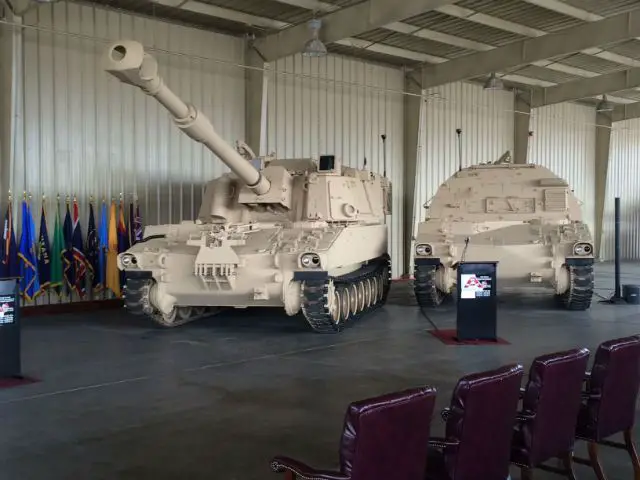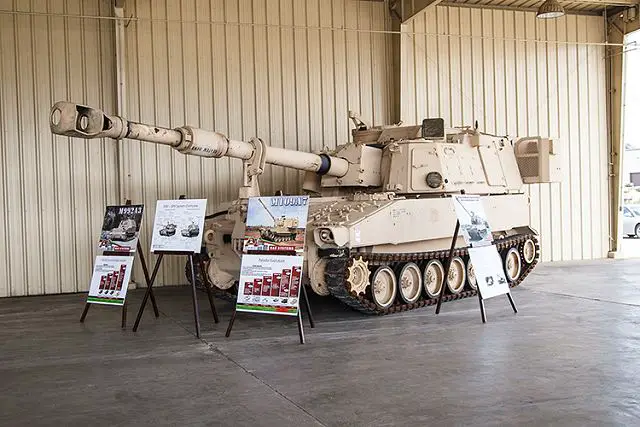Breaking news
Self-propelled howitzer M109A7 and M992A3 carrier ammunition enter in service with U.S. Army 2005141.
| a | |||
Defence & Security News - United States |
|||
| Tuesday, May 20, 2014 07:53 AM | |||
| Self-propelled howitzer M109A7 and M992A3 carrier ammunition enter in service with U.S. Army. | |||
The United States Army's capability to project land power grew this week
with the induction of the M109A7 155mm self-propelled howitzer and its
companion M992A3 carrier ammunition tracked vehicle into low-rate initial
production. The M109A7 and M992A3, formerly known as the Army's Paladin
Integrated Management, known as PIM, program, were both inducted during
a ceremony at Anniston Army Depot where Congressman Mike Rogers, Alabama's
third congressional district representative, described what the systems
bring to the Army. |
|||
 The M109A7 and M992A3, formerly known as the Army's Paladin Integrated Management program, were both inducted into low-rate initial production during a ceremony at Anniston Army Depot, Ala., May 14, 2014. |
|||
| "If we have to fight, we want to make sure it's not a fair fight. These systems ensure that it won't be a fair fight," Rogers said. This summer M109A6 Paladin vehicles and M992A2 Field Artillery Ammunition Support Vehicles will be shipped to Anniston Army Depot where they will be disassembled to provide cab structures, overhauled gun and cannon assemblies, and other vehicle components to industry. The entirely new chassis, built at BAE Systems' facility in York, Pa., will marry with the reworked Anniston components at the new BAE Systems production facility in Eglin, Okla., for final assembly. Anniston Army Depot Commander Col. Brent Bolander welcomed the systems and pointed to his depot's skilled workforce as providing a valuable service to the Army. "The work you will do on these systems will provide our warfighters with a centerpiece of Army readiness," Bolander said. The M109A7 and M992A3 entered Milestone C in October 2013, under the PIM program. They were first fielded, in 1963. For the past 50 years the platform has provided the Army with a highly mobile, armored combat support weapon capable of performing a role in nearly every function: move and maneuver, fires, protection and mission command. In short, artillery systems like the M109A7 and M992A3 represent an in-theater capability that delivers a volume of explosive destruction that otherwise only bombers and precision weapons costing considerably more would be able to deliver. But decades of upgrades to the platform show that it has reached its limit especially in terms of space, weight and power-cooling, or SWaP-C. |
|||
 The new M109A7 155mm self-propelled howitzer of U.S. Army |
|||
"This
modernization effort represents a significant upgrade which includes buying
back space, weight and power-cooling, to ensure the system remains relevant
with room to add new capabilities in the future," said Lt. Col. Michael
Zahuranic, the Army's product manager for self-propelled howitzer systems.
While the vehicle's cannon will remain unchanged, the M109A7 will sport a brand new chassis, engine, transmission, suspension, steering system. These components are also found on the Army's Bradley Fighting Vehicles, thus increasing commonality and reducing logistical footprints and cost. Improved survivability is also a main line of effort in the upgrade program. The vehicle will also feature a new 600-volt on-board power system, which is designed to accommodate emerging technologies and future requirements, as well as current requirements like the Battlefield Network. The electronic gun drive system, which was developed for the cancelled Non-Line-of-Sight Cannon, NLOS-C, provides significant improvement to firing operations. Also, the on-board power system ensures the platform will have enough SWaP-C growth potential to last until 2050. "This [M109A7 Paladin program] is really an example of acquisition done right," said Brig. Gen. David G. Bassett, the Army's program executive officer for Ground Combat Systems. "I want everyone here at Anniston to know that they are essential in delivering critical capabilities to our warfighters." BAE Systems Vice President and General Manager, Mark Signorelli, commanded a M109A3 when he was in the Army and said he took exceptional pride in being part of the system's upgrade. "It's with great pride that I also can see the integration of emerging technologies from our work on earlier developmental artillery programs. I know I speak for everyone at BAE Systems when I tell you how excited we are to begin work on the new M109A7," Signorelli said. |
|||



















